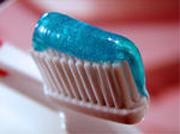
Our teeth Excellent crowns and bridges were made by the Etruscans in the 7th cent. B.C. At about that time, teeth were being extracted in Asia Minor as a cure for bodily ills and diseases. Skills achieved by the Etruscans, Phoenicians, Egyptians, Greeks, and Romans were largely lost during the Middle Ages, when barbers and roving bands of charlatans practiced unskilled dentistry at marketplaces and fairs. Abulcasis, a Spanish Moor, was one of the few in his time who studied dental surgery. The permanent teeth are the second set of teeth that will last the rest of your life. They tend to be more yellow (and not just because of coffee) and are extremely hard. The final set of teeth is made up of 32 teeth, or 16 on each jaw. There are two central incisors for biting, two lateral incisors for biting, two canines for tearing and cutting, four premolars for chewing, and six molars for chewing. Your teeth are by far one of the most important things you use every day. Many people end up neglecting their teeth with improper oral hygiene. You should take care of them by brushing at least twice a day, flossing once per day, and going for regular dental checkups at least twice per year.
Dental cavities At some point or other in ours lives, most of us wind up with a cavity. In most cases, a cavity calls for your dentist to remove the decay and to fill in the tooth area that was removed. There have been a number of advances in the field over the past few years, so if you're one of the lucky ones and haven't had a cavity in a while, you should read up on what is available today so that you understand the choices available to you. Composite resin dental fillings were created as an alternative to traditional metal dental fillings. Tooth fillings colored to look like a natural tooth are known as Composite Resin Dental Fillings,are made of a plastic dental resin. Composite Resin Dental Fillings are strong, durable, and make for a very natural looking smile. Many dental insurance plans cover their use. A special dental material is then used to open up the pores of your tooth's dentin and roughens up the surface of the exposed enamel. This achieves better and stronger bond. The bond resin is applied to stick the composite to your tooth. This material is made of the same dental resin as the composite however it is much more fluid. This layer is then hardened and cured with a very bright light.
Dental dentures Dentures are removable replacements for missing teeth typically made out of an acrylic resin which at times incorporate porcelain or metal for additional structural support. There are two main types of dentures. Both Complete Dentures and Partial Dentures are finely crafted, custom-fitted. If you properly maintain your dentures they will appear natural and provide a perfect smile. Additionally, dentures help strengthen muscles controlling your expressions that require the support of your teeth, rid you of pronunciation problems caused by missing teeth and aid with chewing. The main component of dentures is acrylic resin molded over the top of various combinations and paterns of metal. In oreder to use dentures all of the teeth in the top or bottom or both top and bottom of the mouth are removed. It is recomended that after the removal of the necessary teeth that the patient wait at least a month to have the dentures fit to the mouth. The waiting period allows for proper healing in the mouth to take place.
Dental bonding Bonding is a composite resin filling placed in the back teeth as well as the front teeth. Composites are the solution for restoring decayed teeth, making cosmetic improvements and even changing the color of your teeth or the reshaping of teeth. Bonding will lighten any stains you may have, close up minor gaps and can be used to correct crooked teeth. A very mild etching solution is applied to your teeth to create very small crevices in the tooth's enamel structure. These small crevices provide a slightly rough surface permitting a durable resin to bond materials to your teeth. The resin is then placed on your tooth and high-intensity light cures the resins onto your tooth's surface - with each individual layer of resin hardening in just minutes. When the last coat has been applied to your tooth, the bonded material is then sculpted to fit your tooth and finely polished. You are good candidate for tooth bonding, if you have close, small gaps between your front teeth, or if you have chipped or cracked teeth, you may be a candidate for bonding. Bonding is also used for patients who have discolored teeth, uneven teeth, gum recession or tooth decay. Bonding material is porous, so smokers will find that their bonding will yellow. If you think you are a candidate for bonding, discuss it with your dentist.
Dental bridges A dental bridge is a false tooth, known as a pontic, which is fused between two porcelain crowns to fill in the area left by a missing tooth. The two crowns holding it in place that are attached onto your teeth on each side of the false tooth. This is known as a fixed bridge. This procedure is used to replace one or more missing teeth. Fixed bridges cannot be taken out of your mouth as you might do with removable partial dentures. If you a space from a missing tooth, a bridge will be custom made to fill in the space with a false tooth. The false tooth is attached by the bridge to the two other teeth around the space - bridging them together. Your cosmetic dentist will prepare your teeth on either side of the space for the false tooth. You will be given a mild anesthetic to numb the area, and the cosmetic dentist will remove the an area of each abutment (teeth on either side of the space) to accommodate for the thickness of the crown. When these teeth already have fillings, part of the filling may be left in place to help as a foundation for the crown.
Dental crowns As we age, many of us find ourselves with teeth that are no longer structurally sound. Root canals, lost fillings, decay below a filling, chipping and cracking of the enamel are all things that can lead to large scale defects in a tooth's surface. When the entire surface of the tooth is a problem, but the root system is intact, a crown might be just what the dentist orders. Grinding your teeth, an improper bite, age, fillings and tooth decay can all be contributing factors in the wearing down, cracking or breakage of your teeth. Dental crowns cover the entire visible surface of your affected tooth and add strength, durability and tooth stability. Your cosmetic dentist will usually be able to spot problem areas in your mouth that might lead to tooth damage and a need for crowns. Chewing patterns play a big role as well. By selectively grinding the tips of your middle and back teeth (called cusps) will alter your bite to reduce the stress on at-risk teeth.

Definition explainingDental fillings
- Dental fillings are inserted as restorations in the treatment of dental cavities, after drilling out the cavities.
Dental implants
- Dental implants are surgically fixed substitutes for roots of missing teeth. Embedded in the jawbone, they act as anchors for a replacement tooth, also known as a crown, or a full set of replacement teeth.
Dentures
- Removable complete dentures are full-mouth false teeth, which are used when a patient has no teeth left on either the mandibular arch, the maxillary arch, or both.
Veneer
- A layer of tooth-colored material, usually porcelain or acrylic resin, attached to and covering the surface of a metal crown or natural tooth structure.
Anesthesia
- Total or partial loss of sensation, especially tactile sensibility, induced by disease, injury, acupuncture, or an anesthetic, such as chloroform or nitrous oxide.
- Local or general insensibility to pain with or without the loss of consciousness, induced by an anesthetic.
- A drug, administered for medical or surgical purposes, that induces partial or total loss of sensation and may be topical, local, regional, or general, depending on the method of administration and area of the body affected.
Bridge
- A dental bridge is a prosthesis used in place of missing teeth and may be removable or permanently attached.
Dental cavities
- The formation of cavities in the teeth by the action of bacteria; tooth decay.
- Also known colloquially as tooth decay.
Dental crown
- Full-coverage restoration (sometimes incorrectly called a cap) is a prosthetic tooth designed by a dentist and usually created by a lab technician.
Porcelain
- A hard, white, translucent ceramic made by firing a pure clay and then glazing it with variously colored fusible materials.
Stomatology
- The medical study of the mouth and its diseases.
Tooth bleaching
- Also known as tooth whitening.
|